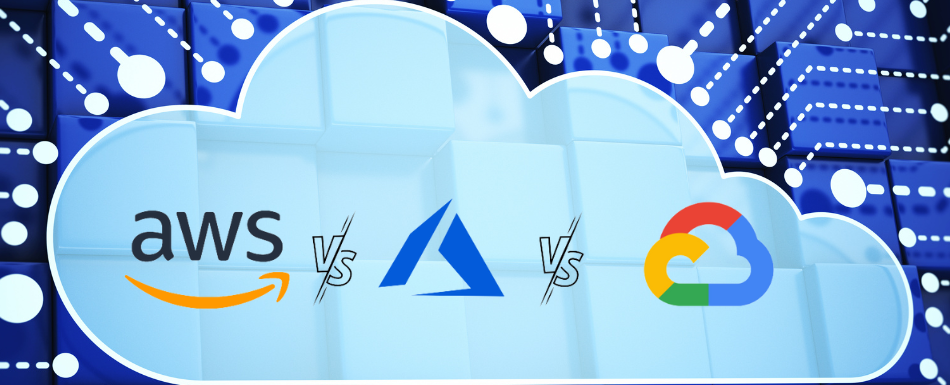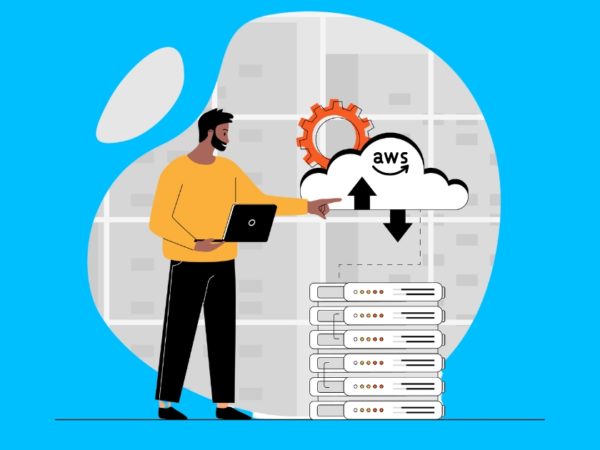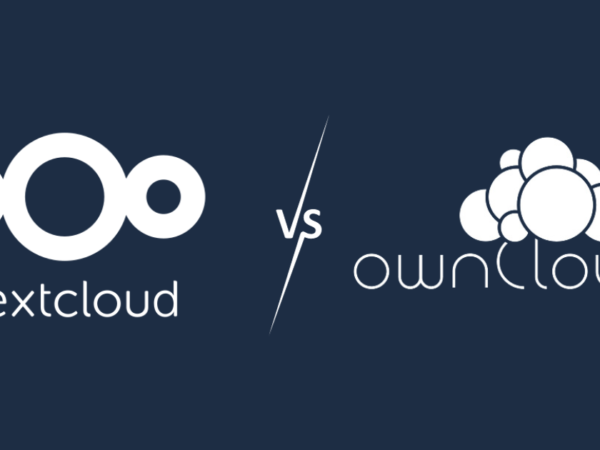Looking for an ideal cloud platform for your company? Find out which is better: AWS vs. Azure vs. Google Cloud.
Cloud-based Infrastructure-as-a-Service (IaaS) is gaining more and more popularity each day as both SMBs and enterprises are opting for this model. Cloud service providers host the core hardware, software, infrastructure, server, and storage facilities that customers can use on a pay-as-you-use basis. These services are highly scalable and support agility and flexibility.
Since cloud computing has already become the driving force for businesses, you might also be considering this for your business. With all the top players in this market, it indeed becomes difficult for organizations to choose the right cloud platform for themselves. But worry no more!
Here, we will tell you the difference between AWS, Azure, and Google Cloud. First of all, let’s get familiar with these service providers.
What Is AWS?
Amazon Web Services, or AWS, is one of the leaders in cloud computing platforms. Being a subsidiary of Amazon, it offers a wide range of services to large enterprises, individual developers, financial services, game tech, and even governments.
Founded in 2006, It initially offered Amazon S3 cloud storage, and elastic compute cloud (EC2) services. Now, you can choose from its 200 fully-featured services for your organization.
Who Uses AWS?
AWS is used by some of the big names in the world, including:
- US Census
- Toyota
- Netflix
- Capital One
- Epic Games
- Coca Cola
- BMW
- Salesforce
- Volkswagon
- University of Exford
- AstraZeneca
- Moderna
- Taco Bell
What Is Microsoft Azure?
Microsoft Azure is one of the fastest-growing cloud-based platforms in the world that has already established its place as a market leader. It started its journey in 2010 but now boasts a large number of Fortune 500 companies as its customers. Being a Microsoft product, Azure offers personalized services to Microsoft-centric enterprises.
It is famous for serving enterprise-level clients and has more than 200 services. Besides Windows-based services, Azure supports open-source platforms, technologies, and languages.
<img alt="YouTube video" data-pin-nopin="true" data-src="https://kirelos.com/wp-content/uploads/2023/03/echo/maxresdefault.jpg64119530a81f4.jpg" height="720" nopin="nopin" src="data:image/svg xml,” width=”1280″>
Who Uses Microsoft Azure?
The client base of Microsoft Azure is also growing. Its renowned clients include:
- Americal Cancer Society
- LaLiga
- Heathrow
- BBC
- NBA
- P&G
- Adobe
- Pepsico
- Audi
- GE
- Bosch
- Uber
- Heineken
- Shell
What Is Google Cloud?
The Google Cloud Platform, or GCP, is the cloud service offered by Google. It also started its journey in 2010 and currently offers 100 services to its customers, including computing, networking, and big data. Popular services such as Google Workspace, Chrome OS, and enterprise Android are also a part of Google Cloud.
<img alt="YouTube video" data-pin-nopin="true" data-src="https://kirelos.com/wp-content/uploads/2023/03/echo/maxresdefault.jpg64119530afe92.jpg" height="720" nopin="nopin" src="data:image/svg xml,” width=”1280″>
Who Uses Google Cloud?
- The State of Illinois
- 20th Century Fox
- Bloomberg
- Colgate-Palmolive
- Unicef
- Vimeo
- Renault Group
- PayPal
- Etsy
- Vodafone
- Allianz
- RBC
- Georgetown University
- J.B. Hunt
- Sharechat
AWS vs. Azure vs. Google Cloud: Feature Comparison
According to this Statista report, at the end of Q4 of 2022, Amazon AWS holds the biggest share of the cloud computing market with a whopping 32% market share. Microsoft Azure is in the second place with a 23% share, while Google Cloud manages to get the third position with a 10% market share.
#2. Availability
The AWS cloud service is available in 99 Availability Zones of 31 geographic regions. It also announced another 15 Availability Zones in 5 more AWS Regions, which are Canada, Israel, New Zealand, Malaysia, and Thailand.
<img alt="YouTube video" data-pin-nopin="true" data-src="https://kirelos.com/wp-content/uploads/2023/03/echo/maxresdefault.jpg64119530b4f8c.jpg" height="720" nopin="nopin" src="data:image/svg xml,” width=”1280″>
Regions where Microsoft Azure is available or coming soon include Asia Pacific, Europe, Africa, the United States, United Kingdom, China, India, Japan, Korea, Taiwan, Australia, Israel, United Arab Emirates, Qatar, Mexico, Brazil, Canada, Chile, Belgium, Indonesia, Malaysia, New Zealand, Austria, Greece, Italy, Spain, Sweden, and Switzerland.
On the other hand, Google Cloud is available in 200 countries and territories. It will also expand its network in the following regions: Qatar, KSA, Malaysia, Thailand, South Africa, Mexico, Italy, Germany, Austria, Greece, Norway, Sweden, and New Zealand.
#3. Storage Facility
Now, have a look at the technologies used by these cloud giants for data storage and database.
AWS
- File Storage: Amazon Elastic File System
- Object Storage: Amazon Simple Storage Service (S3)
- Archive Storage: Amazon Glacier
- Data Lake/ Warehouse: Amazon Redshift
- Cold Storage: Amazon Glacier
Azure
- File Storage: Azure File Storage
- Object Storage: Blob Storage
- Archive Storage: Azure Archive Storage
- Data Lake/ Warehouse: Azure Synapse Analytics
- Cold Storage: Azure Archive Blob Storage
Google Cloud
- File Storage: ZFS/Avere
- Object Storage: Google Cloud Storage
- Archive Storage: Google Storage
- Data Lake/ Warehouse: Google BigQuery
- Cold Storage: Google Cloud Storage Nearline
#4. Cloud Tools
AWS
The cloud tool portfolio of AWS includes the following components:
Elastic Compute Cloud
<img alt="YouTube video" data-pin-nopin="true" data-src="https://kirelos.com/wp-content/uploads/2023/03/echo/maxresdefault.jpg64119530b9969.jpg" height="720" nopin="nopin" src="data:image/svg xml,” width=”1280″>
Elastic Compute Cloud or EC2 is popular as the flagship cloud tool of Amazon or AWS. This web service offers secure and scalable computing capacity in the cloud. Besides Windows and Linux, it also supports instances of bare metal and GPU.
Container Services
Another popular cloud tool of AWS is container services that support Docker, Kubernetes, and Fargate service. It also allows you to automate servers, manage clusters, batch execution of computing jobs, and scale up web applications.
Artificial Intelligence and Machine Learning
AWS services also come with an AI-powered camera named Deeplens that can be used for the development and deployment of ML algorithms for OCR. It also offers Gluon, which you can use to build neural networks without any AI knowledge.
Serverless Computing Services
AWS also offers several serverless services like Lambda, Lex, SageMaker, and Greengrass.
Azure
If you proceed to use Microsoft Azure, you can use its range of cloud tools, including:
Virtual Machines
Virtual Machines is the primary cloud computing service by Microsoft Azure. Its features include hybrid cloud capabilities, enhanced security, a large number of available instances, Instances optimized for AI and ML, and support for Windows Server, Linux, SQL Server, IBM, Oracle, and SAP.
Cognitive Services
<img alt="YouTube video" data-pin-nopin="true" data-src="https://kirelos.com/wp-content/uploads/2023/03/echo/maxresdefault.jpg64119530be398.jpg" height="720" nopin="nopin" src="data:image/svg xml,” width=”1280″>
Various cognitive services like Bing Web Search API, Text Analytics API, Computer Vision API, Custom Vision Service, Face API, and bot services are flagship services of Microsoft Azure. It also offers serverless computing services and analytics and management services.
Tools Supporting Microsoft Applications
Other cloud tools are available as a part of Azure that is compatible with Azure Backup, Visual Studio Team Services, and other on-premise Microsoft applications.
Google Cloud
Compute Engine
Compute Engine is the primary service offered by GCP. It offers Windows and Linux support, carbon-neutral infrastructure, custom and predefined machine types, per-second billing, automatic discounts, etc.
Focus On Kubernetes
<img alt="YouTube video" data-pin-nopin="true" data-src="https://kirelos.com/wp-content/uploads/2023/03/echo/maxresdefault.jpg64119530c4c2b.jpg" height="720" nopin="nopin" src="data:image/svg xml,” width=”1280″>
Companies wanting to deploy containers can utilize Kubernetes Engine from Google Cloud. Since Google has been involved in the Kubernetes project, it boasts deep expertise in this area.
APIs
While using GCP, you can use its dedicated and robust APIs for translation, natural language, and speech recognition.
Bing on AI
Google cloud platform offers TensorFlow, which is an open-source library for developing ML applications.
#5. Security
AWS uses the service of Fortinet for Virtual Private Cloud (VPC) across most of its availability zones. It also uses IAM technology for authentication, Cognito for identity management, and key management service for data encryption.
Azure also uses the Fortinet service for optimized security. Moreover, this cloud platform uses Active Directory Premium for authentication, Active directory B2C for identity management, and Storage service encryption for data encryption.
<img alt="YouTube video" data-pin-nopin="true" data-src="https://kirelos.com/wp-content/uploads/2023/03/echo/maxresdefault.jpg64119530cc610.jpg" height="720" nopin="nopin" src="data:image/svg xml,” width=”1280″>
Lastly, GCP ensures advanced security with FortiGate Next-Generation Firewall. Other technologies used here are Identity and Access Management (IAM) for authentication, AES256 central key management service for data encryption, and Cloud IAM/ Cloud Identity-Aware proxy for authorization or authentication.
#6. Pricing
In AWS, you get a pay-as-you-go plan for pricing, which means you only pay for the services you use. It does not involve any long-term contracts or complex licensing. You can even get a volume-based discount that allows you to pay less when you use more.
Microsoft Azure also offers you competitive, pay-as-you-go pricing for the budget and requirements of your organization. You can cancel the plans anytime and constantly monitor cloud consumption and cost trends.
Like other cloud service providers, Google Cloud also lets you only pay for what you use. It follows a transparent and innovative pricing approach that helps you save money.
AWS vs. Azure vs. Google Cloud: Which Is Better
There is no one-box-fits-all answer to this question. The best cloud service for you will depend on your organizational requirements and budget.
If you have a budget constraint, you can go for Google Cloud or the free tier of AWS. If you need to manage a complex system, it is better to choose AWS.
Those building Microsoft or Windows apps should opt for Microsoft Azure for better support and compatibility. Even for SMBs, Azure is a better option than AWS and GCP.
While choosing, you should also consider the data center location and its distance from your geographic location.
Wrapping Up
AWS, Azure, and Google Cloud all offer amazing cloud-based services to their clients. In this article, we have discussed the basic differences between these three service providers so that you can understand which one is most suitable for your organizational requirements.
Once you have chosen the right platform, you can opt for it without any worries. These platforms will deliver you powerful services and help you to grow your business. You can read another article we wrote on cloud hosting platforms.



